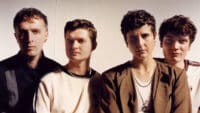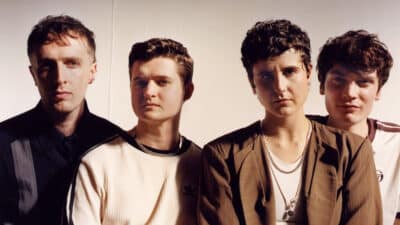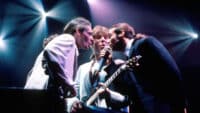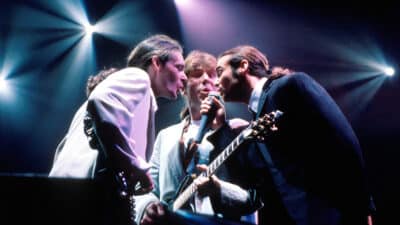Interview
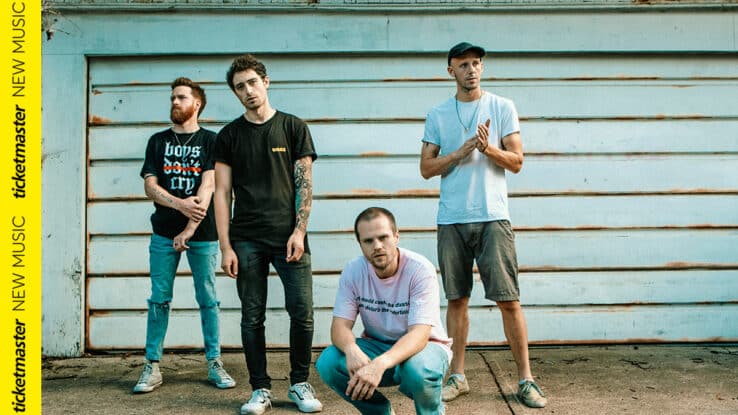
Interview
Dead Poet Society: “We wanted to change rock music…”
Frontman Jack Underkofler talks the evolution of Dead Poet Society, and the emotional landscape explored on their latest LP
Formed back in 2013 by a group of friends at Boston’s Berkeley College of Music, Dead Poet Society aren’t a band looking to cut corners.
Guided by an unwavering commitment to authenticity, the quartet’s 2021 album -!- propelled the quartet into the spotlight, with a decade of perseverance finally yielding sold-out shows and recognition. Emerging as a powerhouse live act, their bold departure from alt rock norms has since seen them grace stages alongside Biffy Clyro and Badflower, skilfully honing their powerful blend of pop, alt rock, hip-hop, and new wave influences.
Constantly looking to evolve their sound and deepen their connection with listeners, the band’s latest album, FISSION, captures the bittersweet – and more often simply bitter – emotions that surface in the aftermath of a tumultuous relationship. Candidly delving into frontman Jack Underkofler’s own experiences, it’s a collection of genre-bending songs surging with confidence, from a band on the verge of something truly incredible.
Now poised for a breakthrough after a decade of unwavering dedication, Dead Poet Society are staring down their biggest UK tour to date. Before all that, Underkofler talks us through the band’s gradual rise, the importance of emotionally honest songwriting, and their special connection with European audiences.
It’s been a couple of years since you released -!- and it feels like the momentum has ramped up for Dead Poet Society in that time. Having been a band for over a decade, how has it been to see things accelerate since that album came out?
It’s stunning. I have these moments where I sit and think, ‘Whoa, it’s actually working’. Nobody gave a sh*t for almost 10 years and then out of nowhere we suddenly have fans and we’re selling out venues. When you work on it for so long you forget that it’s supposed to happen eventually. The first time that I had that feeling was when we sold out Nijmegen in the Netherlands. That was a legit venue, not just a bar or some other repurposed room. The venue was only open that day because we were playing it, and we sold it out. That felt insane.
Since the pandemic it feels like people’s attention spans are shorter, but what’s striking about Dead Poet Society is how little opportunity you leave for boredom. Bending modern rock conventions and bringing so many eclectic influences into your sound, how important is that genre-evading vision to you?
It wasn’t necessarily our goal to do that, but it’s a side effect. We wanted to change rock music because when we started the band [rock] was just f*cking bad! Every band sounded like it could have soundtracked a Ford commercial, and it felt so fake and boring. We wanted to make something that felt fresh, and there were only two or three bands doing that at the time. That vision came from us not really caring that we were a rock band and refusing to define ourselves by that. We just placed a focus on keeping ourselves interested and finding feelings that we hadn’t felt before. If that had come out in the form of Thai classical music, we would have written a Thai classical music album.
Having found such growth with -!-, did you have a particular motive going into album three?
The basic goal was just to get better. Not just in our playing and songwriting, but also in our expression and our ability to connect with the listeners. We wanted to keep diving deeper into our little rabbit hole to see where that took us, but we knew that the next album wouldn’t sound like -!-. We were different people when that album was made, and I think that’s important. That was a mental battle when we started this new album, but I think we did a good job of separating what we truly felt from what we thought other people wanted to feel. We didn’t want to write an album solely for the people who were going to listen to it, because we’re still doing this for ourselves. Nobody was listening to us before, so we were just shooting this stuff out into the universe, but now people are paying attention. It made it much easier to doubt what we were doing, but we got there in the end.

Something that defines this band is emotion, and whilst FISSION centres on a breakup, it’s also a platform for you to be candid about your experiences with paranoia. Is channelling your personal life into music something that comes naturally for you?
The more I’ve done it, the easier it’s gotten, but songwriting tends to be very painful. Not just in an emotional way, but also in a frustrating way because writing rock music that’s not cheesy is hard! It’s unreasonably painful to sit with things for a month before you can come up with a line. It’s funny though, because I don’t think I’m smart enough to channel things directly in my songwriting. I can never directly be like, ‘This is what I’m thinking about, and this is how I’m feeling’, I just hope that whatever comes out of my mouth when I start writing is what I want to write about. It’s a lot of shooting in the dark.
As a fan of music, have you always connected with artists who are particularly candid in their songwriting?
Yes. Artists who sing and write the way that they speak have always been very attractive to me, and that’s the way that we write music. It’s a beautiful skill to be able to say things poetically, but I have always found that the best way to express myself is to write exactly how I talk. That’s the closest connection to who I am, and I don’t have to figure out a fancy way to say things. Growing up, I always admired John Mayer and Bob Dylan because they had a straightforward way of putting things. I also loved bands like The Killers and Coldplay who have that ability to speak poetically, but my songwriting style is more reflective of the folkier artists I’ve always loved.
A particularly candid song on this record is HURT, which explores your journey of trying to make it in the music industry. Do you have any advice for hopeful musicians you may feel as though they’re hitting a brick wall with following their dreams?
It’s a game of endurance and you have to find ways to escape losing your mind. Go for walks and spend time with friends and family. We’re group creatures by nature, and spending time with others is the ultimate reset. Isolation is an addiction, but it’s the exact opposite of what you should be doing. If you find yourself getting really beat down and exhausted, go spend time with friends. That’s a sure-fire way to make you feel better.
Despite the challenges you explore within these songs, there’s a real theme of self-confidence and self-belief across this record. My Condition feels like a great example of that…
I wrote the first verse for that song six years ago. We used to do this thing in rehearsal where we would try and play the worst sounding thing we possibly could. One time we tried to do that, and the beat from My Condition came out. We were amazed by how sick it sounded, so we recorded it and put it aside to work on for -!-.
I had that first verse, but we could not write a chorus to save our lives. Eventually it got shelved, so we never used it on the last album. When we came to write this record, it resurfaced, and eventually Jack [Collins, guitarist] texted me saying, ‘What do you think about this for a chorus?’ What he sent me was what we ended up using, so after five years we finally got it. We worked on the chorus together and I wrote a second verse, then we wrote the bridge in the studio. I think it’s one of the best songs we’ve ever written, and it’s definitely one of the ones I’m most proud of.
You’re heading over to the UK and Europe for a run of shows soon. Dead Poet Society seem to have forged a second home across the Atlantic, so what do you enjoy most about crowds in this part of the world?
I’m 96% Irish, and Europe is the same as the US, yet completely different. There are some towns in England that feel like LA and are a little too cool for school, and London’s usually insane. At those shows, everybody’s already there to party so I don’t need to do anything except facilitate that party. My favourite shows are the ones where it feels like we’re not even the focus, and everyone was going to have a good time regardless of if we showed up. Everybody goes insane, and I find it’s easy to attain that in parts of Europe. People in Europe connect with our music in a way that I never would have expected, and it’s gone from, ‘I hope people like us over there’ to, ‘I can’t wait to get back there’.
It feels as though Dead Poet Society are on the verge of something very special now, which must feel incredibly rewarding after a decade of hard work…
When we released 81 Tonnes at the tail-end of last year, we kept looking at the metrics on the artist-facing version of Spotify. It has a ‘listening now’ section which shows you everybody who is listening to your songs at that very moment, and it was double what we normally see. I sent it to my dad, and he was like, ‘If this was a stock… I’d buy it’. That’s what you want, and it’s no longer a case of hoping we make it. If we keep pushing, and if we do this right, it will happen. It doesn’t feel like a guessing game anymore.
Dead Poet Society start their UK tour on March 13. Find tickets here.






